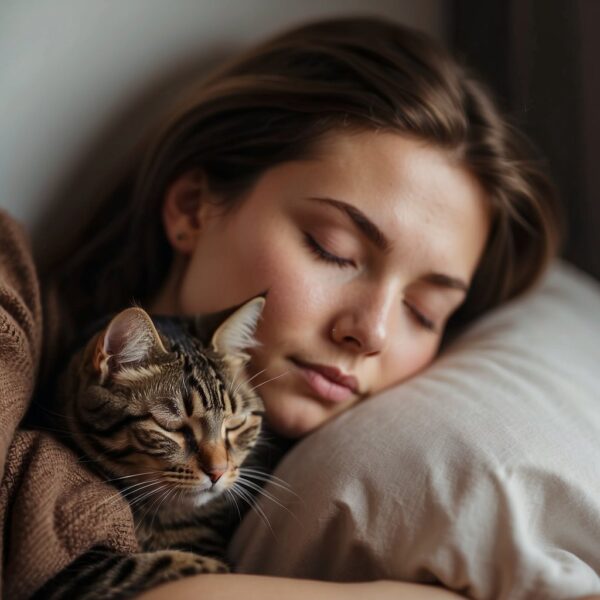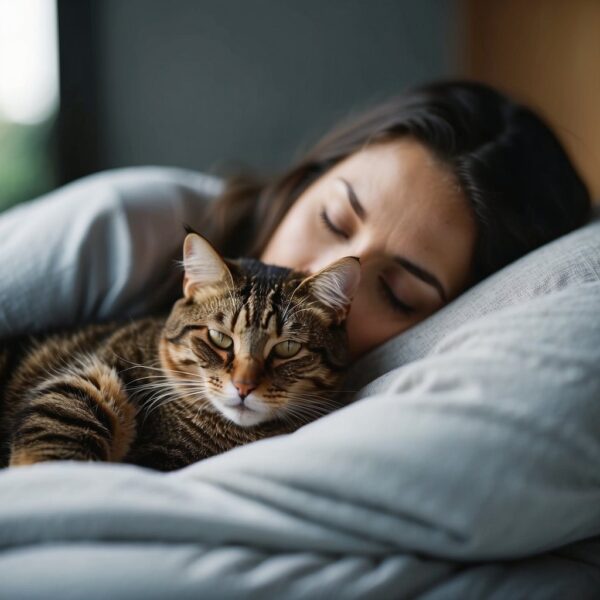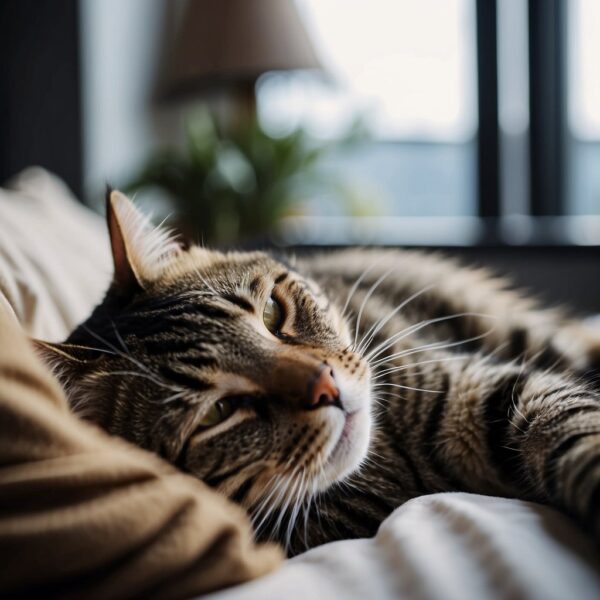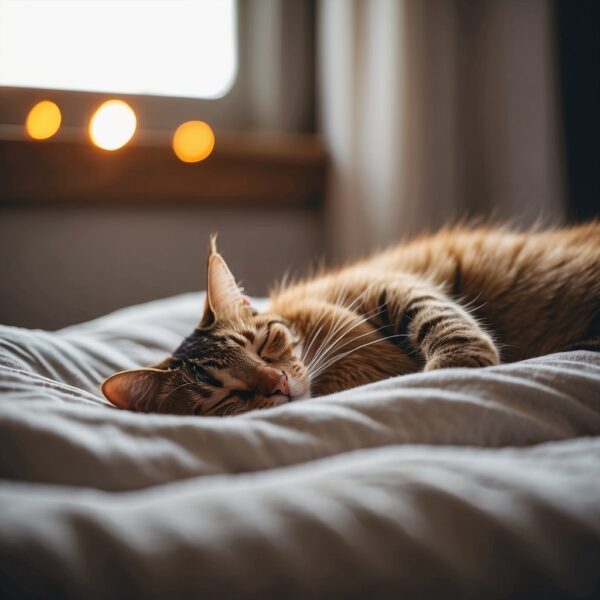
Health Benefits From Sleeping With Your Cat:
Many cat parents find comfort in the presence of their feline companions, and this extends into the nighttime routine of sleeping. While opinions have varied over the years regarding the wisdom of sharing a bed with pets, recent research indicates that there can be several health benefits associated with the practice. Cats often seek the warmth and security of their human counterparts, and in turn, provide a unique form of emotional support.
The relationship between humans and cats while sleeping is not merely a matter of habituation but involves a mutual exchange of psychological comfort. Studies suggest that individuals may experience a decrease in anxiety and depression by having their cats close during the night. Additionally, the physical presence of cats can offer a sense of security, which for some, translates into a deeper and more restful sleep. However, it is important to balance these benefits with attention to hygiene and the potential for allergic reactions, making regular veterinary checkups and cleanliness a priority for cat parents.
Key Takeaways
- Sleeping with cats can provide psychological relief and companionship.
- Health benefits include potential reductions in anxiety and improved sleep quality.
- Maintaining cleanliness and health checkups for cats are essential for safe co-sleeping.
Understanding the Cat-Human Sleep Connection
The reciprocally beneficial relationship between cats and their human companions extends into the domain of sleep, where the feline sleep cycle and co-sleeping behaviors contribute to the dynamics of shared rest between species.
The Feline Sleep Cycle
Cats experience a distinct sleep cycle that is characterized by periods of light and deep sleep. Typically, cats are crepuscular, meaning their natural activity peaks occur during the dawn and dusk hours. They spend approximately 12-16 hours a day sleeping, with variations depending on age and personality.
Light Sleep: This stage allows cats to rest while still being alert to their surroundings. During this phase, they can quickly awaken if necessary.
Deep Sleep: Typically occurs in shorter durations, deep sleep is essential for cats’ physical health and mental well-being. It’s when their bodies repair tissues and strengthen the immune system.
REM Sleep: Cats also experience rapid eye movement (REM) sleep, where most dreams occur. This stage is essential for cognitive functions.
Co-Sleeping with Pets: Behavioral Aspects
Co-sleeping with pets, specifically cats, involves a mutual adjustment of sleeping habits between the pet and the parent. Cats often seek the warmth and security of their guardians, rendering the bedroom a favored site for co-sleeping.
Adaptation: Cats and their parents may adjust their sleep cycles to accommodate one another. Parents often report a sense of safety and relaxation when their cat sleeps beside them, which can lead to improved sleep quality.
Comfort: Creating a comfortable sleep environment, such as a dedicated spot on the bed, can promote co-sleeping. Providing a pet-friendly bedroom setting is crucial for nurturing a consistent co-sleeping arrangement.
Behavioral Patterns: Cats that share a bed with their parents typically establish a routine. They usually select the same spot each night and may exhibit affectionate behavior before settling down.
In understanding the Cat-Human sleep connection, it’s clear that while cats are naturally nocturnal to some extent, they can adapt their sleeping patterns to align with those of their human counterparts, thus fostering a harmonious co-sleeping environment.

Psychological and Emotional Advantages
Sharing your sleep space with a feline companion can have measurable impacts on your psychological and emotional wellbeing, including the reduction of stress and anxiety, alleviation of loneliness, and overall enhancement of emotional health.
Stress and Anxiety Reduction
Sleeping with a cat can reduce stress and anxiety levels for their human companions. Cats are known to serve as non-judgmental, comforting presences which can lead to a decrease in the levels of cortisol, the stress hormone, in their parents. The act of petting a cat has been identified to release endorphins and assist in the calming of the nervous system, thus supporting mental health.
- Proven Benefits:
- Decrease in cortisol levels.
- Release of calming endorphins.
Combatting Loneliness
For individuals who may feel isolated, a cat’s presence overnight can serve as a strong antidote to feelings of loneliness. Cat parents often express a unique bond with their pets, and the consistent presence of a cat can provide a sense of companionship that mitigates the sense of being alone, especially during the nighttime hours.
- Key Points:
- Constant companionship of a feline.
- Mitigation of loneliness through bonding.
Enhancing Emotional Health
Sleeping with a cat can boost the psychological well-being of individuals. Reports indicate that cat parents often feel happier and more confident. They tend to have a healthier emotional state as they handle daily stressors better due to the emotional support provided by their feline partners. Moreover, the responsibility of caring for a pet can also instill a sense of self-worth and purpose, further enhancing an individual’s emotional health.
- Emotional Gains:
- Enhanced self-worth and happiness.
- Improved confidence in daily life.

Physical Health Benefits
Sharing a slumber with a feline companion can surprisingly bolster the physical well-being of its human counterparts. Scientific studies highlight several physical health advantages, such as bolstering the immune system, improving heart health, and utilizing the therapeutic vibrations of a cat’s purr.
Boost to the Immune System
Exposure to cats can strengthen the immune system by gently exposing individuals to pet dander and allergens, which over time can lead to a reduced reaction to these substances. Encountering these allergens during a restful sleep can increase immunological resilience, potentially leading to fewer allergy symptoms.
Effects on Heart Health
Studies suggest that the mere presence of a cat in one’s life may be associated with a decrease in the risk of heart attacks and other cardiovascular diseases. The emotional bond and reduced stress levels attributed to the company of a cat during sleep might contribute to a healthier heart and overall physical health.
The Healing Power of Purring
Cats’ purring, within a frequency range of 20-140 Hz, is not only calming but may have a biological healing effect on human bones and muscles. This subtle vibration is thought to promote recovery from injuries and can be a balm to those suffering from sleep disorders, facilitating a more restful sleep near their cat. While it’s not a substitute for medical care from a vet, the soothing sounds can offer real health benefits to cat parents.
Safety and Health Considerations
When opting to sleep with your cat, it’s crucial to address health concerns such as allergies and disease transmission, and to take steps to mitigate the associated risks.
Managing Allergy Risks
Individuals who have allergies or asthma may experience negative reactions when sleeping with a cat. Allergies to cats are triggered by proteins found in the cat’s dander, saliva, and urine. As cats groom themselves and move around the house, allergens are spread, which can lead to an allergic person experiencing symptoms such as:
- Sneezing
- Runny or stuffy nose
- Itchy eyes
- Asthma exacerbation
For those with compromised immune systems, exposure to allergens can pose an additional safety consideration. To manage allergy risks:
- Create an Allergy Plan: Consult with an allergist to determine individual sensitivities and create a management plan.
- Frequent Cleaning: Reduce allergens by washing bedding regularly and vacuuming spaces where the cat spends time.
- Pet Grooming: Regular bathing and grooming of the cat can reduce the spread of dander.
- Separate Spaces: Consider designating the bedroom as a cat-free zone to reduce allergen exposure during sleep.
Understanding Disease Transmission
It’s important to be aware of the potential for disease transmission from cats to humans, especially through close contact such as sharing a bed. Cats can carry bacteria, parasites, and other serious diseases that can be transmitted to humans including:
- Toxoplasmosis: Caused by a parasite found in cat feces.
- Ringworm: A fungal infection that can be spread from a cat’s fur.
- Cat Scratch Disease: A bacterial infection that can occur from scratches.
To mitigate the risk of contracting diseases:
- Vaccinations: Keep your cat’s vaccinations up-to-date to protect against common feline diseases.
- Veterinary Checks: Regular vet visits ensure your cat is healthy and parasite-free.
- Hygiene: Practice good hygiene such as washing hands after handling your pet and avoid allowing the cat to lick your face or any open wounds.
- Prompt Attention: If bitten or scratched, clean the area immediately and seek medical attention if necessary, especially if you have a risk of death due to a severely compromised immune system.

Creating a Conducive Sleep Environment
To reap the health benefits of sleeping with your cat, ensuring the sleep environment is suited for both you and your feline friend is critical. It should cater to the cat’s natural territorial instincts while providing comfort and maintaining sleep hygiene to prevent disruptions.
sleeping with your cat: Balancing Territory and Comfort
Cats are territorial creatures that require a space they can claim as their own. Offer a comfortable place within the bedroom for your cat, such as a designated cat bed or cushion, which can be placed near your bed to reinforce the bond between you two. For cat parents with larger pets, like a dog, it’s imperative to provide a separate dog bed to avoid territorial disputes which can lead to stress and sleep disruption for all parties involved.
To further enrich your cat’s territory, provide items imbued with familiar scents, as these offer an additional layer of comfort and security. This could be a blanket or a toy the cat is fond of. Be cautious to keep food and water bowls away from the sleeping area, as the proximity might lead to unwanted messes or nocturnal activity that could disrupt sleep.
Maintaining Sleep Hygiene
Sleep hygiene refers to the practices that foster continuous and restful sleep. Both human and cat sleep can be affected by the presence of allergens and dust, so it is crucial to keep the bedroom clean. Regularly wash bedding and any cat-specific blankets or beds to reduce allergens such as dander and dust.
Minimizing noise and light can also contribute to better sleep hygiene. While cats aren’t known to snore as humans can, they are sensitive to noise that could startle them during their sleep cycles. Ensure the bedroom is as quiet as possible, and consider using blackout curtains to emulate the tranquility of the night, helping both you and your cat to avoid sleep disruption.
For cats that enjoy nocturnal play, keep toys out of the bedroom to discourage active play during resting hours. Instead, engage your cat in play before bedtime to help them feel tired and ready to sleep through the night.
Special Considerations for Different Life Stages
Cats of varying ages have distinct needs that can impact the health benefits of sharing a sleep space. It’s important for cat owners to consider the life stage of their feline companions when inviting them to nap together, as kittens and senior cats require different levels of care and attention.
Sleeping with Kittens
Kittens require ample sleep for their development and may frequently nap throughout the day and night. Cat owners should monitor the following when sleeping with kittens:
- Environment: Ensure the sleeping area is safe and kitten-proofed, with no small objects they could ingest or spaces where they could become trapped.
- Bedding: Soft, warm bedding can comfort kittens and mimic the presence of littermates.
- Health Monitoring: Regular check-ins with a vet are crucial for kittens to maintain vaccinations and monitor their growth and health.
- Sleep Patterns: While kittens may adjust their sleep patterns to their owners, they still need more sleep than adult cats, often up to 18 hours a day.
Adapting to Senior Cats
Senior cats tend to nap more than their younger counterparts, and their comfort during sleep is paramount for their well-being. Owners of senior cats should consider these factors:
- Joint Health: Provide an easily accessible, orthopedic bed to support their aging joints.
- Vet Visits: Increased veterinary care, including biannual check-ups, can help manage age-related health issues.
- Sleep Disturbance: Minimize disturbances to avoid stress, as senior cats may have a lighter sleep.
- Warmth: Maintain a warm sleeping environment to help alleviate any discomfort from arthritis or other age-related conditions.
The Cultural Context of Sleeping with Cats
Throughout different cultures, sleeping with pets, particularly cats, is a practice entwined with various beliefs and social habits. Americans and people worldwide have long invited cats into their homes, where they’ve become cherished companions. The choice to share a bed with these pets often stems from the need for closeness and companionship that cats fulfill.
In many households, cat parents regard their feline friends as family members, not just animals. Thus, allowing a cat into the bed at night becomes a natural extension of this bond, reinforcing a sense of purpose and nurturing the human-animal relationship. This ritual can significantly improve sleep quality as the presence of a cat can be calming, which may lead to a more restful night.
Sleeping with cats has also been influenced by societal views on pet guardianship. As modern lifestyles become more isolated, the value placed on pets for emotional support has increased. Cats provide a nonjudgmental presence that can alleviate loneliness and enhance the wellbeing of their parents.
It’s important to note, however, that while this practice is common, it is not universal. The decision to share a sleep space with a cat is personal and can be affected by individual health needs, cultural background, or personal preference.
In summary, the cultural context of sleeping with cats reflects our desire for intimate bonds with our cats and the manifold benefits they bring to our lives. The dynamics of these relationships are personal, yet universally understood among pet guardians across different cultures.

Sleeping With Your Cat: Frequently Asked Questions
Allowing cats in the bed can have health benefits and drawbacks. Understanding what these are can enhance the sleeping experience with your feline friend.
What are the potential health advantages of allowing your cat to sleep in the bed with you?
Cats can be a source of comfort and relaxation. Their presence has been associated with lower stress levels and can even potentially lower blood pressure thanks to the calming effect of their purring. These small but meaningful advantages contribute to a person’s overall well-being.
Could sleeping with a cat potentially lead to any adverse health effects?
Yes, there are potential adverse health effects to consider. Individuals with allergies to cat dander may experience exacerbated symptoms when in close contact with a cat for extended periods. Additionally, cats can bring in dirt and allergens from outdoors, which may not be conducive to a clean sleeping environment.
Are there any risks of contracting parasites from a cat that shares your bed?
Cats that are not regularly treated for parasites can transmit them to humans. These include ectoparasites like fleas, which can infect bedding and cause itching and discomfort. To minimize these risks, it is important to maintain regular veterinary care and hygiene for your cat.
What are the psychological benefits of sleeping alongside your cat?
Sleeping with a cat can improve psychological health by decreasing anxiety and providing companionship, which may help to combat feelings of loneliness. The rhythmic sound of a cat’s purr can also be soothing and might aid in falling asleep faster.
Does the location of where a cat chooses to sleep on your bed have any significance?
Cats often choose sleeping spots based on warmth and security. A cat’s chosen location on the bed can provide insight into their comfort level and trust in their guardian. However, the significance of a particular spot is more an indicator of the cat’s preference than anything else.
Can the presence of a cat in your bed influence the quality of your sleep?
The presence of a cat can both positively and negatively influence sleep quality. While a cat’s purring and warmth can be comforting, their nocturnal habits and movements might disrupt sleep patterns. It’s important for cat parents to consider their individual sleep needs in relation to their cat’s behavior.